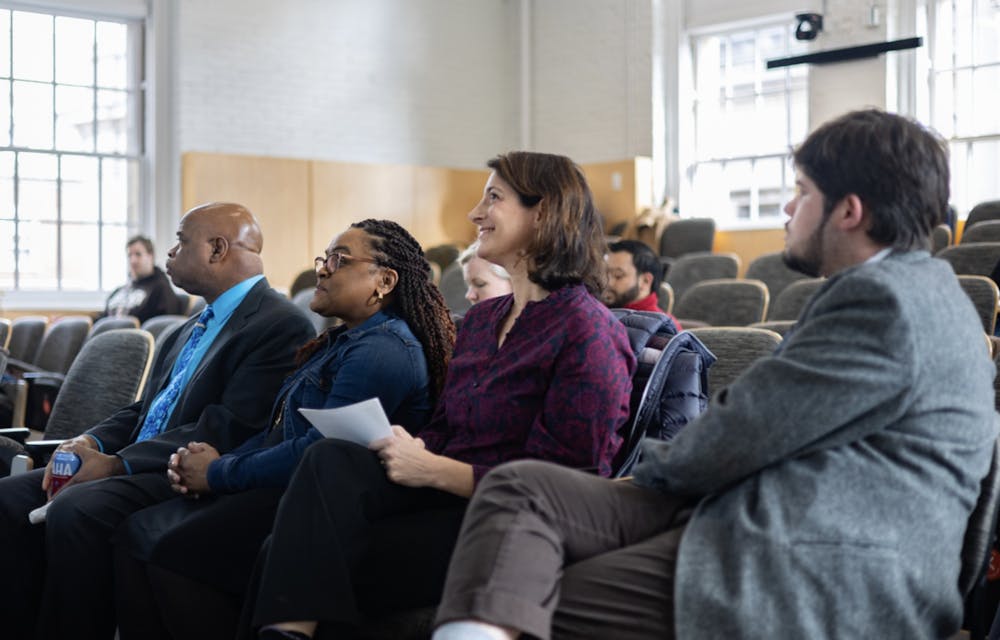The Brown University Community Council discussed the University’s relationship with the broader Providence community during its second meeting of the semester in Friedman Hall Wednesday, resuming conversations from last month’s meeting.
The 37-person council serves as a “university-wide representative forum for discussion, debate and advisory recommendations on a wide spectrum of issues and concerns,” according to the BUCC website. The council is composed of University administrators, faculty, students, alumni and community members.
The meeting was led by a panel made up of four University community members: Katie Silberman, director of community relations in the Office of Government and Community Relations; Brenda Ice, senior associate dean and senior director of Residential Life; Rodney Chatman, vice president for Campus Safety; and Matt Rauschenbach ’23, a Bonner Community Fellow.
Ice discussed the University’s incoming “good neighbor program and initiative,” which takes a three-pronged approach to prepare students for living off-campus.
First, the program would aim to equip students with independent living skills, including conflict resolution, budgeting and lease signing. Second, it would introduce students to their Providence neighbors through community group meetings and similar initiatives. Third, it would offer coaching on how students can communicate with residents, which Ice described as “an opportunity to re-engage our students in the art of interpersonal dialogue.”
Rauschenbach drew from his experiences working on a local political campaign and as a Bonner Community Fellow to contribute insight on student engagement and community impact.
“One of the benefits of a (political) campaign is that you get to go and knock on people’s doors, tell them who you are and then hear a bit about what they think,” he said.
Referencing the new Brook Street Residence Halls set to house students this fall, Rauschenbach explained that there was “a fairly significant number of people who thought that there could have been better communication” about how the street would “basically (be) blocked off” due to the construction.
For Rauschenbach, this conflict is part of a larger issue: Providence residents are concerned that the University is “a bit distant” from Providence community members, who want to be “in conversation” with Brown.
“I think building relationships with the neighborhood associations around the city (and) city council people could go pretty far in allowing (residents) to see that Brown understands the mutual relationship between the city of Providence and the University,” he added.
Silberman explained that the Office of Government and Community Relations aims to guide the University on community engagement efforts. “Community Relations is focused on ensuring that Brown is a good neighbor and a valuable anchor in Providence,” she said. The office serves as a “front door to the University for anyone who wants to connect with Brown.”
Silberman emphasized the University’s contributions to Providence. Brown is one of the largest private employers in the state, creating thousands of jobs beyond direct employees. The University has also made direct financial contributions to the Providence Public School District and strived to increase academic opportunities for PPSD students.
Community engagement is also a top priority for the University’s Department of Public Safety, according to Chatman. He explained that the Department hosts several small events — like community coffee chats — so that students can get to know DPS officers by name and feel comfortable expressing safety concerns.
He emphasized DPS’ response to student concerns involving lighting around campus. Following student complaints, the department conducted a survey on campus lighting and identified 80 problem locations. Most of the concerns were addressed by the Department of Facilities, he said, with three unresolved issues falling under the City’s jurisdiction.
As the meeting wrapped up, Rauschenbach left council members by encouraging them to talk to their neighbors.
“Have these conversations with your neighbor where you walk across the street and introduce yourself,” he said. “There’s nowhere better than Rhode Island to be able to meet people.”

Sofia Barnett is a University News editor overseeing the faculty and higher education beat. She is a junior from Texas studying history and English nonfiction and enjoys freelancing in her free time.





